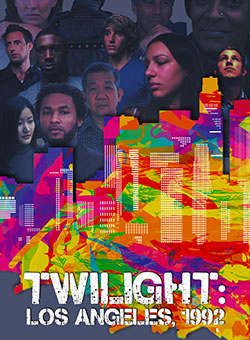
Following what became known as the “L.A. Riots of 1992,” playwright Anna Deavere Smith interviewed more than 300 people associated with the event (or who witnessed it). From those interviews, Deavere created an intensely emotional and moving play. A vibrant and thrilling production of Twilight: Los Angeles, 1992 is currently being staged in Milwaukee at Next Act Theater. The play was written as a one-woman show, with the actor becoming more than 30 characters. Each character is quoted verbatim from Deavere’s notes as well as from news reports from the time. Twilight had a brief run in Broadway’s Cort Theater in 1994, with Deavere playing all the parts. The Next Act version (which sounds more challenging and visually interesting), divides the characters among six actors. These characters include some direct participants, such as Rodney King’s aunt (Rodney King was savagely beaten by white police officers), ex-police chief Daryl Gates and Reginald Denny, a white truck driver who was pulled from his truck and nearly beaten to death by several black rioters. The audience also hears from lesser-known and virtually unknown people affected by the riots. One is an unnamed member of the jury in the Rodney King case – whose “not guilty” verdict of the police officers sparked the riots. There’s also a Beverly Hills realtor, a talent agency executive, and a Korean merchant whose store burned to the ground during the riots. Although the play was written about events more than 20 years ago, the series of monologues are still chillingly accurate today. They will feel very familiar to Milwaukee audiences (one of the most segregated cities in America) as well as to Los Angeles and other places. Thanks to the sharp direction of producing artistic director David Cecsarini and Jonathan Smoots, the play makes no judgments about the circumstances surrounding these events. It sticks to each character’s words about his/her reaction to police procedures and a flawed justice system. Oddly, this play about words can be difficult to describe in print. The directors intentionally cast the play against gender and type. Men sometimes play women of a different ethnicity than their own, or women play men of a different ethnicity. The overall effect packs a powerful punch, as if to shout, “we are all in this together.” Although all of the actors are convincing, mention must be made of Marti Gobel, who is spot-on as a male, Jewish police commissioner, as well as a ditzy, white female realtor. Angela Iannone, another favorite of Milwaukee audiences, expresses the multitude of conflicting emotions told by black opera singer Jessye Norman. All three of these characters (police commissioner, realtor and opera singer) take the stage several times during the play. In her final vignette as Jessye Norman, Ianonne presents a fascinating discussion on the place of singing in the black experience. These are but a few gems distilled from this treasure trove. Interestingly, the play’s title, “Twilight,” comes from the deeply felt and well-articulated musings of a Los Angeles gang member. He tells how he feels while living in a sort of surreal half-world; it’s not completely daytime, nor completely dark. Among the most interesting monologues is one delivered by actor Ryan Schabach, in his role as truck driver Reginald Denny. (Schabach is one of four men in the cast, which also includes: Rammel Chan, Andrew Muwonge and Andrew Perez). In one segment, Rodney King’s aunt reflects wistfully on her childhood, when “blacks, Mexicans, Koreans . . . were all friends.” Like a few of the characters, she wonders how things had gotten so out of hand. One of the police officers accused in the case of Rodney King’s beatings shares his opinions, too. He believes he can “no longer be a hero to my kids.”
One quibble: Although the monologues do seem to loosely follow a dramatic arc, there are simply too many of them. This reviewer wouldn’t be able to point to the episodes that should be edited out, since each one is so fascinating. But without a cohesive plot to keep the audience’s interests, the play seems about 20 minutes too long.
All of the scenes are played out on the same set, consisting of several, unadorned wood platforms. A projection screen located upstage gives each person’s name, title and photo at the beginning of each segment. This gives the audience a clearer picture (literally) of whose words are being quoted. The screen also replays the familiar, filmed images of the beatings, the fires and the overall chaos of the time. It’s especially important for these scenes to be shown to younger audience members, who may not even have been born when these riots drew national attention to Los Angeles.
